Key takeaways:
- Community workshops foster personal connections and creativity, enhancing participants’ sense of belonging through shared experiences.
- Engaging with the audience and understanding their interests is essential for tailoring workshop content effectively.
- Gathering feedback is crucial for improving workshops and aligning offerings with participants’ needs and preferences.
- Creating a supportive environment encourages open dialogue and vulnerability, strengthening community bonds.
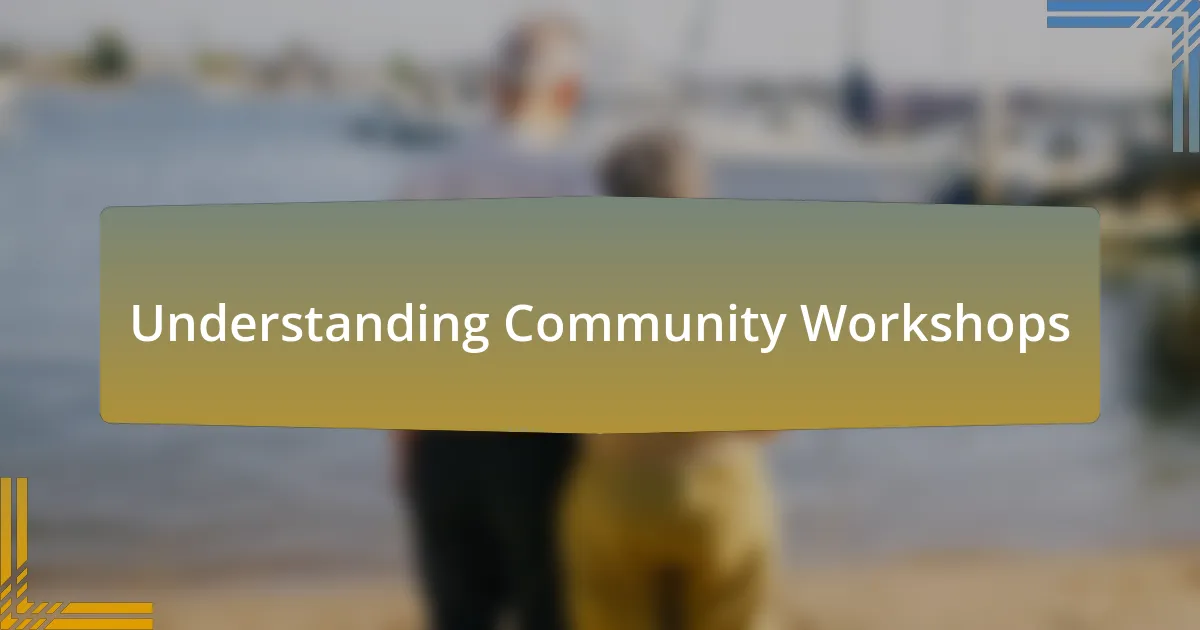
Understanding Community Workshops
Community workshops can serve as a vibrant platform for learning and connection. I remember attending a workshop focused on local history, led by a resident who had lived through some of the town’s most significant moments. Hearing about the past from someone who experienced it firsthand truly ignited a passion for our shared community narrative. Isn’t it fascinating how personal stories can transform collective understanding?
These workshops often foster creativity, encouraging participants to express themselves in new and exciting ways. I once facilitated a session centered around painting, where even those who claimed they had “no artistic talent” surprised themselves with their creations. This experience not only built confidence but also sparked friendships among attendees. How can such shared experiences deepen our sense of belonging?
Moreover, community workshops are about much more than just acquiring skills; they are about building relationships. I recall the warmth during a cooking class where participants shared family recipes, accompanied by laughter and stories from their kitchens. In those moments, the act of creating together became a bond that transcended the workshop itself. Isn’t it interesting how simple activities can cultivate a stronger sense of community?
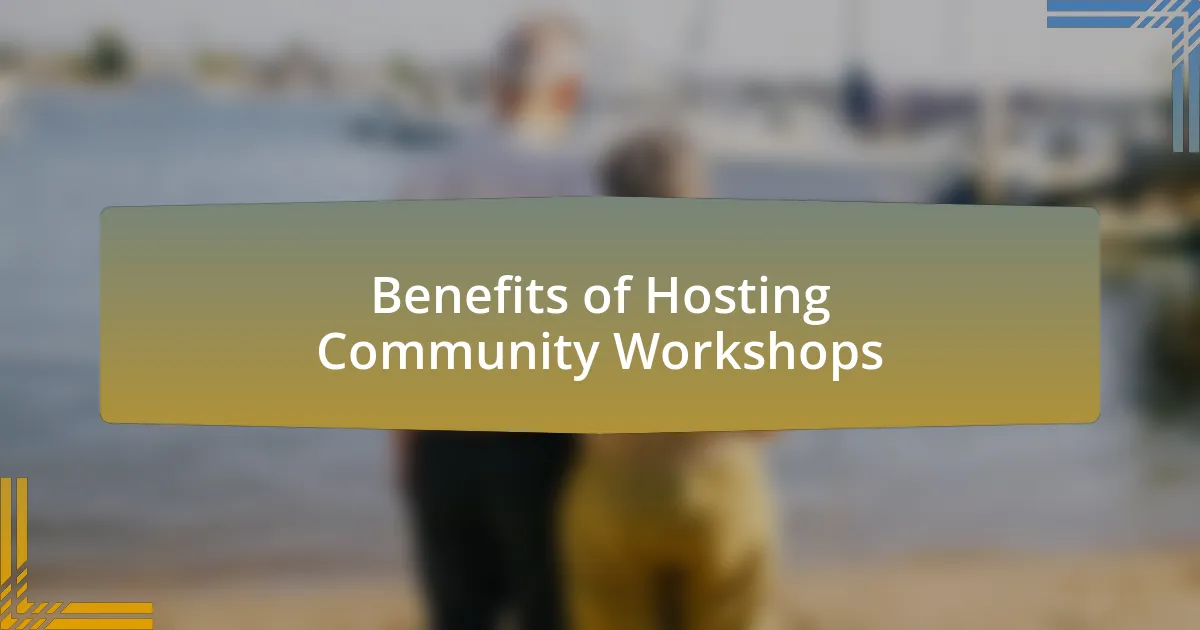
Benefits of Hosting Community Workshops
Hosting community workshops offers a wealth of benefits that extend beyond mere education. I remember organizing a gardening workshop where participants shared their love for plants. One woman, in particular, brought seedlings passed down from her grandmother. Witnessing the pride in her eyes as she explained their significance highlighted how workshops can connect generations. Isn’t it intriguing how these gatherings can also preserve history through personal legacies?
Another advantage is the opportunity for skill sharing, which I found particularly evident during a tech-savvy seniors’ workshop I led. As attendees helped one another troubleshoot gadgets, I could feel a sense of empowerment spreading across the room. It was inspiring to see participants not just learning but teaching each other. How often do we find ourselves in situations where collaboration can lead to newfound confidence and independence?
Lastly, the mental health benefits derived from participating in such workshops cannot be overstated. After running a mindfulness and meditation session, I received heartfelt messages from attendees expressing how the experience brought them peace and clarity. Engaging in a supportive group environment fosters a sense of belonging that combat feelings of loneliness. Don’t you think that creating these spaces for connection can lead to healthier, happier communities?
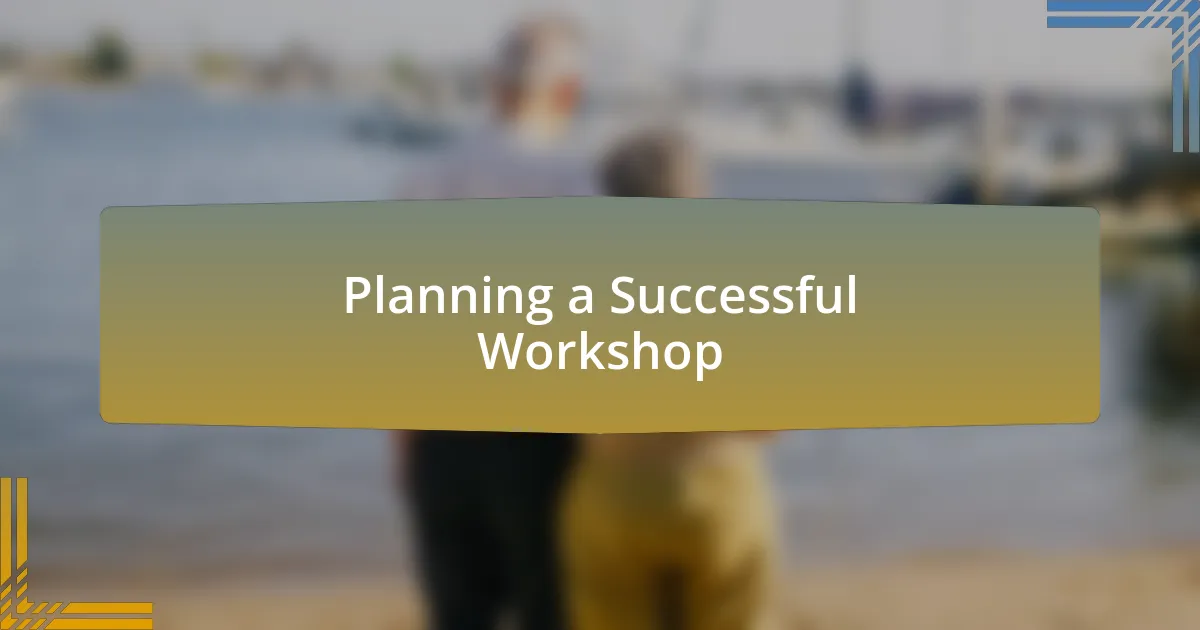
Planning a Successful Workshop
When planning a successful workshop, knowing your audience is crucial. I once organized a writing workshop aimed at retirees, and I quickly learned that understanding their interests and backgrounds made all the difference. Engaging with participants beforehand not only shaped the agenda but also helped me tailor content that resonated with them. How often do we overlook the importance of just asking what people want to learn?
Logistics play a significant role in creating an inviting atmosphere. I recall a cooking workshop where we underestimated the importance of a comfortable space with good lighting and easy access to tools. The participants were so much more engaged when they felt at ease and equipped. Isn’t it fascinating how the right environment can spark inspiration and creativity?
Lastly, incorporating interactive elements can significantly enhance the experience. During a craft workshop, I encouraged participants to share stories related to their projects, which led to unexpected connections and laughter. I often reflect on how these personal interactions turned a simple gathering into a memorable event. What more could we achieve if we embraced the power of storytelling in our workshops?
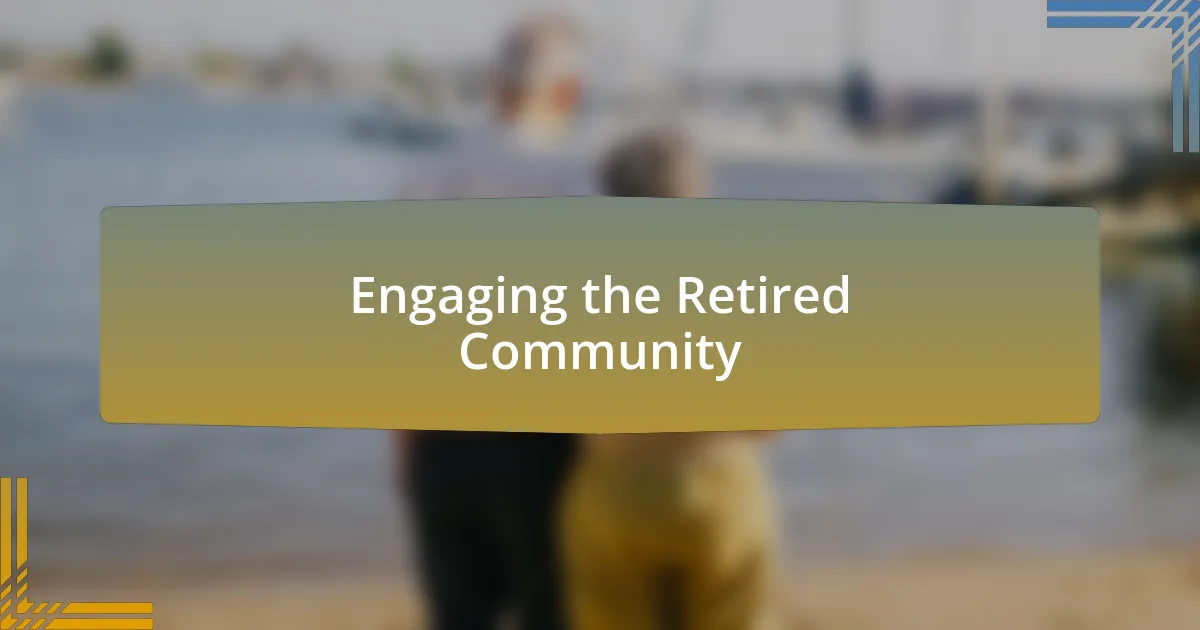
Engaging the Retired Community
Engaging the retired community requires a genuine desire to create meaningful connections. I remember leading a gardening workshop where some participants shared their lifelong love for plants, sparking conversations that stretched beyond the flowers. Isn’t it interesting how a simple shared interest can transform strangers into friends? By allowing these discussions to flourish, I witnessed firsthand the power of community and the deep bonds that can form through shared experiences.
When I introduced a tech tutorial aimed at helping retirees navigate smartphones, I approached it as less of a lecture and more of a collaborative exploration. I’d often ask, “What apps do you wish you could use, and why?” The responses were eye-opening; folks shared everything from their dreams of keeping up with grandkids on social media to yearning for simpler ways to manage their health. I found that by addressing their specific concerns and curiosity, engagement skyrocketed as participants began to feel empowered rather than overwhelmed.
Creating a supportive and open atmosphere is paramount. During a storytelling session, I encouraged everyone to share their favorite travel moments, and one lady’s vibrant tale about her adventure in Italy lit up the room. I still remember the smiles and laughter that filled the space as others chimed in with their own stories. That moment reinforced for me the idea that having a platform where retirees can share their passions ultimately enriches everyone involved. Isn’t that the beauty of a tight-knit community?
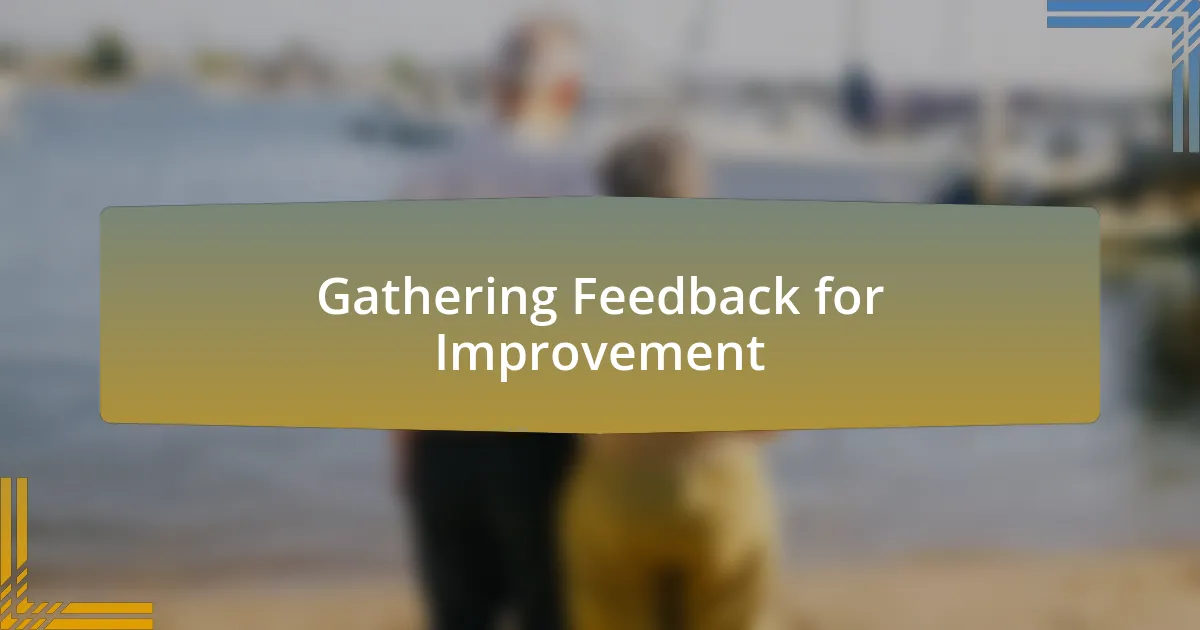
Gathering Feedback for Improvement
Gathering feedback is an invaluable tool for enhancing the community workshops we offer. I remember hosting a cooking class where participants were encouraged to share their thoughts at the end. One gentleman suggested adding a session focused on healthier recipes, and that single idea transformed our following workshops. Isn’t it fascinating how one piece of feedback can lead to a ripple effect of change and growth?
After a series of art workshops, I implemented a simple feedback form to capture participants’ experiences. One response particularly stuck with me; a participant wrote how the class had rekindled their love for painting, which they hadn’t pursued in years. This feedback inspired us to create an exhibition of their artwork, celebrating our community’s creativity while also confirming that we were on the right track. How fulfilling is it to see those we serve derive joy from what we offer?
Not all feedback is glowing, and that’s where I have learned the most. During a book club session, I received constructive criticism about the choice of literature being too obscure. While it stung initially, this honest insight allowed me to recalibrate future selections to align more closely with the interests of the group. Embracing such input can be uncomfortable, but isn’t growth often born from discomfort?
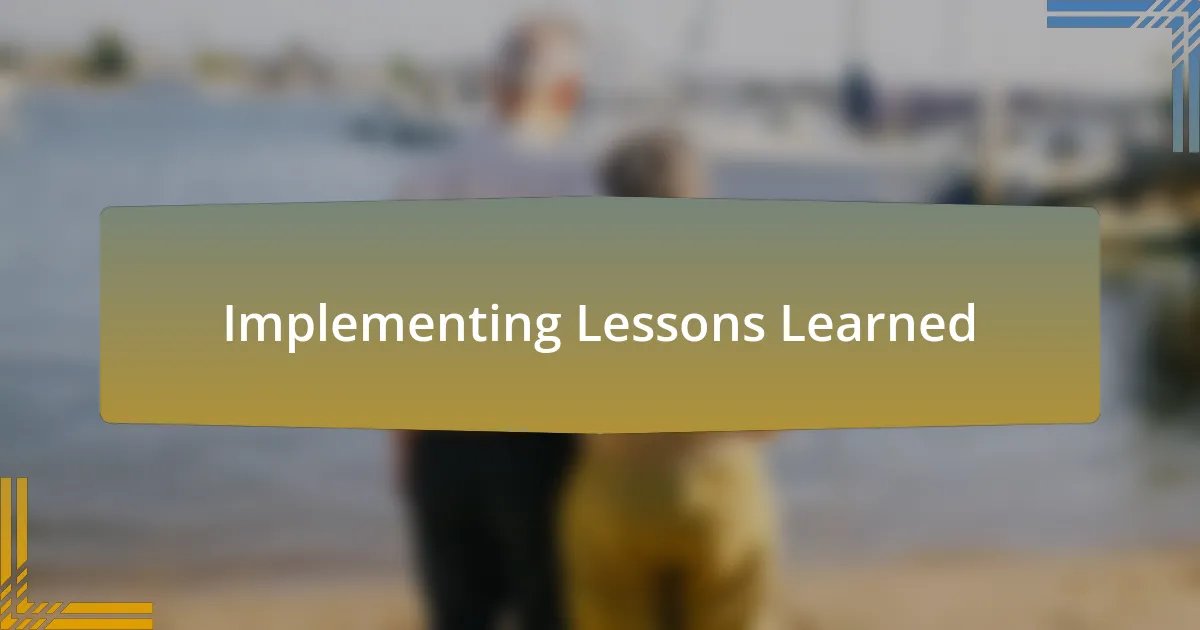
Implementing Lessons Learned
When it comes to implementing lessons learned, I often reflect on the importance of trial and error. I vividly recall a workshops series on gardening. Initially, I assumed that the participants would be eager to dive into complex horticultural techniques, but I quickly discovered they craved a more foundational approach. Adjusting my plans to accommodate their needs not only improved our sessions but also deepened my connection with the group. Isn’t it amazing how adapting to feedback can foster a stronger community?
Another key lesson I’ve taken to heart is the significance of follow-up. After a recent photography workshop, I reached out to participants to see how they were applying what they learned. One individual shared how they had started a photo project documenting daily life in the retirement community. That resonated with me; supporting their creativity and seeing the practical application of our workshop sparked joy and served as a reminder that continued engagement enhances the overall experience. Have you ever thought about how small gestures can lead to profound outcomes?
I learned that creating an environment for open dialogue is vital. During a recent session, I encouraged participants to share not just their successes but also their struggles. The vulnerable moments that emerged not only strengthened bonds but also led to a shared commitment to support one another. Witnessing the transformation of our discussions was powerful; how often do we underestimate the impact of simply listening to each other?